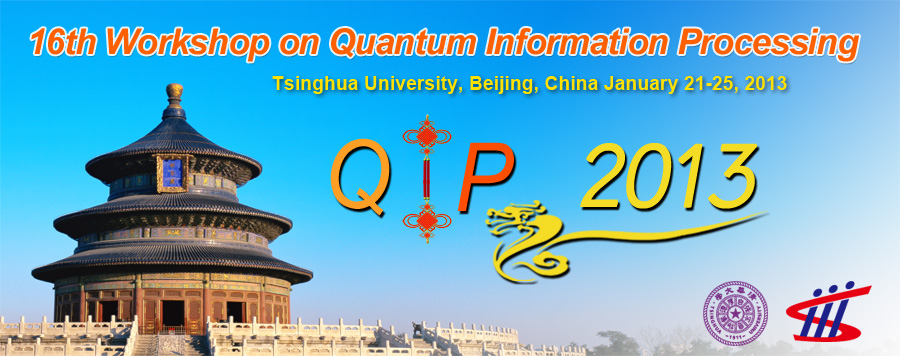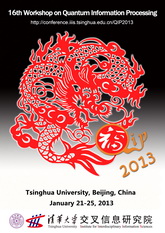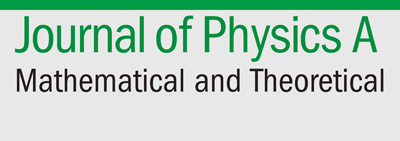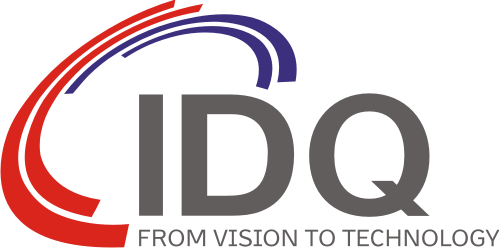Poster Session – Schedule:
The Programme Committee has accepted 150 posters, which will be presented in two poster sessions at the Lecture Hall (3rd floor), New Tsinghua Xuetang (which is just next to the Concert Hall) on Monday/Tuesday (21/22 January 2012) from 17:00-19:30.
Installation Instructions:
Each accepted poster will be assigned a panel, large enough to hold an A0 size poster (i.e. width 33.1 in = 84.1 cm, height 46.8 in = 118.9cm). In view of space constraints at the venue we require contributors to use portrait (tall) rather than landscape (wide) orientation.
Poster Awards:
Participants are invited to select posters for awards. The best poster will be determined by the participants’ votes on each day.
SESSION 1
3. Jun Zhou, Hpng-Yi Fan and Jun Song
A new type of photon-added squeezed coherent state and its statistical properties
4. Stacey Jeffery, Robin Kothari and Frederic Magniez
Improving the Quantum Query Complexity of Boolean Matrix Multiplication Using Graph Collision.
5. Michal Hajdusek and Mio Murao
Direct evaluation of pure graph state entanglement
6. Marco Tomamichel, Serge Fehr, Jedrzej Kaniewski and Stephanie Wehner
Strong Parallel Repetition for a Monogamy-of-Entanglement Game
7. Nathan Wiebe, Daniel Braun, Seth Lloyd
Quantum Data Fitting
9. Jianxin Chen and Andreas Winter
Non-Additivity of the Entanglement of Purification (Beyond Reasonable Doubt)
11. Jordi Tura Brugués, Remigiusz Augusiak, Philipp Hyllus, Marek Kus, Jan Samsonowicz and Maciej Lewenstein
Entangled symmetric states of N qubits with all positive partial transpositions
12. Fernando de Melo, Piotr Cwiklinski and Barbara Terhal
The Power of Noisy Fermionic Quantum Computation
13. Carlos Fernández-González, Norbert Schuch, Michael M. Wolf, J. Ignacio Cirac and David Pérez-García
Gapless Hamiltonians for the toric code using the PEPS formalism
14. Robert Hübener, Andrea Mari and Jens Eisert
Wick’s theorem for matrix product states
15. Francesco Buscemi, Nilanjana Datta, Patrick Hayden, Min-Hsiu Hsieh, Mark Wilde and Andreas Winter
Communication costs of quantum measurement simulation and quantum-to-classical lossy data compression
16. Mario Berta, Omar Fawzi and Stephanie Wehner
Quantum to classical randomness extractors
17. Jedrzej Kaniewski, Marco Tomamichel, Esther Haenggi and Stephanie Wehner
Secure bit commitment from relativistic constraints
19. Tanvirul Islam and Stephanie Wehner
Computability limits non-local correlations
20. Michael Kastoryano, Michael Wolf and Jens Eisert
Precisely timing dissipative quantum information processing
21. Cécilia Lancien and Andreas Winter
Distinguishing multi-partite states by local measurements
22. Loïck Magnin and Jérémie Roland
Explicit relation between all lower bound techniques for quantum query complexity
23. Nilanjana Datta, Milan Mosonyi, Min-Hsiu Hsieh and Fernando Brandao
Strong converses for classical information transmission and hypothesis testing
24. Corsin Pfister and Stephanie Wehner
If no information gain implies no disturbance, then any discrete physical theory is classical
25. Hong Wei Li, Piotr Mirononwicz and Marcin Pawlowski
On the relation between semi and fully device independent protocols
26. Eyuri Wakakuwa and Mio Murao
Chain rule implies Tsirelson’s bound
27. Andris Ambainis and Ashley Montanaro
The quantum query complexity of combinatorial group testing
28. Cyril Stark
Simultaneous Estimation of Dimension, States and Measurements
29. Waldemar Klobus, Andrzej Grudka, Michal Horodecki, Pawel Horodecki, Ryszard Horodecki and Lukasz Pankowski
Mutual uncertainty
31. Yasuhiro Takahashi and Seiichiro Tani
Collapse of the Hierarchy of Constant-Depth Exact Quantum Circuits
32. Jianxin Chen, Zhengfeng Ji, David Kribs and Bei Zeng
Minimum Entangling Powers are Maximum
33. Sergii Strelchuk, Michal Horodecki and Jonathan Oppenheim
Entanglement Recycling and Generalized Teleportation
34. Yi-Kai Liu, Steven Flammia, David Gross and Jens Eisert
A Restricted Isometry Theorem for Pauli Measurements, and the Sample Complexity of Tomography
36. Rahul Jain, Yaoyun Shi, Zhaohui Wei and Shengyu Zhang
Efficient protocols of generating bipartite classical distributions and quantum states
37. Andrew Childs, Debbie Leung, Laura Mancinska and Maris Ozols
A framework for bounding nonlocality of state discrimination
38. Abuzer Yakaryilmaz
Public-qubits versus private-coins
39. Laura Mancinska, Giannicola Scarpa and Simone Severini
New separations in zero-error channel capacity through projective Kochen-Specker sets and quantum coloring
40. Damián Pitalúa-García
Deduction of an upper bound on the success probability of port-based teleportation from the no-cloning theorem and the no-signaling principle
41. Sofyan Iblisdir, Mauro Cirio, Octavi Boada and Gavin Brennen
Low Depth Quantum Circuits for Ising Models
42. Niel De Beaudrap
A linearized stabilizer formalism for systems of finite dimension
43. Yuchun Wu and Guang-Can Guo
Structure feature of Clauser-Horne-Shimony-Holt type Bell inequalities
44. Daniel Nagaj, Rolando Somma and Maria Kieferova
Quantum Speedup by Quantum Annealing
46. Peng Xue and Barry Sanders
Controlling and reversing the quantum-to-classical transition of a quantum walk by driving the coin
47. Xie Chen, Zheng-Cheng Gu, Zheng-Xin Liu and Xiao-Gang Wen
Many-body Entanglement in Symmetry Protected Topological Systems
48. Anne Marin and Damian Markham
Sharing quantum and classical secrets
49. Cedric Beny and Tobias Osborne
An information-theoretic formulation of the renormalization group
50. Yang Liu and Shengyu Zhang
Quantum and randomized communication complexity of XOR functions in the SMP model
51. Renato Renner, Vedran Dunjko, Joseph F Fitzsimons and Christopher Portmann
Composability of secure delegated quantum computation
52. Adam Bookatz, Pawel Wocjan, Stephen Jordan and Yi-Kai Liu
Testing quantum expanders is co-QMA-complete
53. Yaoyun Shi and Xiaodi Wu
Limits of quantum one-way communication by matrix Hypercontractive Inequalities
54. Damián Pitalúa-García
Quantum information causality
55. Salman Beigi
A New Quantum Data Processing Inequality
56. Salman Beigi and Amin Gohari
Information Theoretic Benefit of Entanglement in Classical Communication Settings
57. Cedric Beny and Tobias Osborne
Inverting the renormalization group
58. Matthew Coudron and Ramis Movassagh
Unfrustration Condition and Degeneracy of Qudits on Trees
59. Alex Arkhipov
Extending and Characterizing Quantum Magic Games
60. Philippe Faist, Frédéric Dupuis, Jonathan Oppenheim and Renato Renner
Quantitative Quantum Landauer’s Principle
61. John Smolin
The IBM Superconducting Quantum Computer Project: Experimental Achievements and Benchmarking
62. Matthew Amy, Dmitri Maslov, Michele Mosca and Martin Roetteler
A meet-in-the-middle algorithm for fast synthesis of depth-optimal quantum circuits
63. Andrzej Grudka, Michał Horodecki, Paweł Horodecki, Paweł Mazurek, Łukasz Pankowski and Anna Przysiężna
Long distance quantum communication over noisy networks.
64. Andrzej Grudka, Karol Horodecki, Michal Horodecki, Pawel Horodecki, Ryszard Horodecki, Pankaj Joshi, Waldemar Klobus and Antoni Wojcik
Quantifying contextuality
65. Hector J. Garcia, Igor L. Markov and Andrew W. Cross
Efficient Inner-product Algorithm for Stabilizer States
67. Isaac Kim
Perturbative analysis of topological entanglement entropy from conditional independence
68. Vadym Kliuchnikov, Dmitri Maslov and Michele Mosca
Fast and efficient exact synthesis of single qubit unitaries generated by Clifford and T gates
69. Brittanney Amento, Martin Roetteler and Rainer Steinwandt
Efficient quantum circuits for binary elliptic curve arithmetic: reducing T-gate complexity
70. Guillaume Duclos-Cianci and Krysta Svore
A State Distillation Protocol to Implement Arbitrary Single-qubit Rotations
71. Jeongwan Haah
Commuting Pauli Hamiltonians as maps between free modules
72. Normand Beaudry, Stefano Mancini and Renato Renner
Security proof of two-way quantum key distribution protocols with partial device independence
74. Robin Blume-Kohout, Dylan Maher, Lee Rozema, Ardavan Darabi, Chris Ferrie and Aephraim Steinberg
The power of null-space sampling: Quadratic speedups for quantum estimation
SESSION 2
75. Gorjan Alagic, Stephen Jordan and Stacey Jeffery
Quantum and Classical Circuit Obfuscation with Braids
76. Laura Mancinska and David Roberson
Graph homomorphisms for quantum players
78. Jan Bouda, Matej Pivoluska, Martin Plesch and Colin Wilmott
Weak randomness seriously limits the security of QKD
79. Min Li, Yong-Sheng Zhang and Guang-Can Guo
Quantum random walk in periodic potential on a line
80. Fernando Iemini and Reinaldo O. Vianna
Computable Measures for the Entanglement of Indistinguishable Particles
81. Mateus Araújo, Marco Túlio Quintino, Costantino Budroni, Marcelo Terra Cunha and Adán Cabello
Complete characterization of the n-cycle noncontextual polytope
82. Robert Matjeschk, Andre Ahlbrecht, Albert Werner, Martin Enderlein, Christopher Cedzich, Michael Keyl, Tobias Schaetz and Reinhard Werner
Quantum Walks with Non-Orthogonal Position States
83. Courtney Brell
Universal Topologically Protected Adiabatic Cluster State Quantum Computation
84. Wieslaw Laskowski, Christian Schwemmer, Daniel Richart, Tomasz Paterek and Harald Weinfurter
Experimental Schmidt Decomposition and State Independent Entanglement Detection
86. Junghee Ryu, Marek Zukowski, James Lim and Jinhyoung Lee
Operational Quasiprobabilities for Qudits
87. Tobias Fritz, Ana Belén Sainz, Remigiusz Augusiak, Jonatan Bohr Brask, Rafael Chaves, Anthony Leverrier and Antonio Acin
Local Orthogonality: a multipartite principle for correlations
88. Shelby Kimmel and Marcus P. Da Silva
Robust Quantum Process Characterization Beyond Fidelity to Clifford Unitaries
89. David Reeb and Michael M. Wolf
(Im-)Proving Landauer’s Principle
90. Marcin Wiesniak, Mohamed Nawareg, Marek Zukowski and Koji Maruyama
Bell Inequalities with Lower Order Correlations
91. Thiago Maciel, André Cesário, Reinaldo Vianna, Carlile Lavor and Douglas Gonçalves
Analects on quantum tomographies and inference schemes.
92. Nelly Ng, Siddarth Joshi, Chen Ming Chia, Mario Berta, Christian Kurtsiefer and Stephanie Wehner
Experimental implementation of bit commitment in the noisy-storage model
93. Raqueline A. M. Santos and Renato Portugal
Simulations of Quantum Markov Chains on Percolation Graphs
95. Yingkai Ouyang and Wee Hao Ng
Truncated quantum channel representations for coupled harmonic oscillators
96. Ansis Rosmanis
Toward Adversary Bound for Element Distinctness with Small Range
97. Marco Piani, Tan K Chuan, Jean Maillard, Kavan Modi, Tomasz Paterek and Mauro Paternostro
Quantum discord bounds the amount of distributed entanglement
98. Yanbao Zhang, Scott Glancy and Emanuel Knill
Efficient quantification of experimental evidence against local realism
99. Tzyh Haur Yang, Miguel Navascues, Matthew McKague and Valerio Scarani
Robust Self Testing of Pure Entangled States
100. Phuc Thinh Le, Jeysthur Ang, Lana Sheridan and Valerio Scarani
Robustness of Bell inequalities against reduced “free will” attacks and its relation to Bell-based randomness expansion.
101. Thomas Lawson, Anna Pappa, Damian Markham, Iordanis Kerenidis and Eleni Diamanti
Adversarial entanglement verification without shared reference frames.
102. Anna Pappa, Thomas Lawson, André Chailloux, Eleni Diamanti and Iordanis Kerenidis
Adversarial Multipartite Entanglement Verification in realistic conditions.
103. Michele Dall’Arno, Elsa Passaro, Rodrigo Gallego and Antonio Acin
Robustness of Device Independent Dimension Witnesses.
104. Michele Dall’Arno, Elsa Passaro, Rodrigo Gallego, Marcin Pawlowski and Antonio Acin
Attacks on Semi-Device-Independent Quantum Protocols.
105. Ciara Morgan and Andreas Winter
Towards a strong converse for the quantum capacity of degradable channels
106. Adam Paetznick, Vinayak Pathak, Lucy Liuxuan Zhang and Austin Fowler
Surface code braid compaction
107. Mark Um, Xiang Zhang, Junhua Zhang, Yang-Chao Shen, Ye Wang, Dong-Ling Deng, Lu-Ming Duan and Kihwan Kim
Random Numbers Certified by Quantum Contextuality
108. Joseph M. Renes and David Sutter
Efficient Quantum Channel Coding Scheme Requiring No Preshared Entanglement
109. Frédéric Dupuis, Lea Kraemer, Philippe Faist, Joseph M. Renes and Renato Renner
Generalized Entropies
110. Adam Bouland and Scott Aaronson
Any Beam Splitter and Any Phase Generate Universal Quantum Linear Optics
111. Alex Bocharov, Yuri Gurevich and Krysta M. Svore
Decomposing a Single-Qubit Gate into an Efficiently Universal Basis
112. Matthew Wardrop
A Two-Qubit Exchange Gate Proposal for Singlet-Triplet Quantum Dot Qubits
113. Sania Jevtic, Matthew Pusey, David Jennings and Terry Rudolph
Visualizing two qubit states: the steering ellipsoid
114. Natasha Gabay and Nicolas Menicucci
Optical Continuous-Variable Cluster States as Schwinger Spin States
115. Xiang Zhang, Mark Um, Junhua Zhang, Shuoming An, Ye Wang, Dongling Deng, Chao Shen, Luming Duan and Kihwan Kim
State-independent quantum contextuality in an indivisible system.
116. Ramij Rahaman
Nonlocality test for Genuine Multipartite Entanglement without inequality.
117. Jacob Cale Bridgeman, Aroon O’Brien, Stephen D Bartlett and Andrew C Doherty
Simulating a Class of Critical Quantum Systems using Tensor Network Methods.
118. Poya Haghnegahdar and Robert Raussendorf
Transforming AKLT-like states to Graph-States (universal resources for measurement based quantum computation).
119. Rafael N. Alexander and Nicolas C. Menicucci
Efficient use of squeezing in continuous-variable cluster computing.
120. Andrew Darmawan and Stephen Bartlett
Producing an approximate qubit cluster state as the unique ground state of a deformed antiferromagnetic Hamiltonian.
121. Dominic Williamson and Stephen Bartlett
Quantum Computation Within Symmetry-Protected Topologically Ordered Phases of Spin Chains
122. Patrick Coles
Unification of different views of decoherence
123. Youngrong Lim, Mauro Paternostro, Minsu Kang, Jinhyoung Lee and Hyunseok Jeong
Power of macroscopic entanglement for detection-loophole free Bell test
124. Tommaso Federico Demarie, Gavin Brennen and Nicolas Menicucci
Topologically Ordered States with CV Modes on a 2D Lattice
125. Jinwoo Park, Mark Saunders, Yong-Il Shin, Kyungwon An and Hyunseok Jeong
Violation of local realism with entanglement between an atom and a coherent cavity field
127. Matthias Kleinmann, Costantino Budroni, Jan-Ake Larsson, Otfried Gühne and Adan Cabello
Optimal inequalities for state-independent contextuality
128. Dmitry Kravchenko
Expected Values of Some Random Nonlocal Games
129. Mauro Faccin, Zoltan Zimboras and Jacob Biamonte
Quantum Transport Enhancement by Time-Reversal Symmetry Breaking.
130. Dominic Berry, Richard Cleve and Sevag Gharibian
Gate-efficient discrete simulations of continuous-time quantum query algorithms.
132. Daniel Gottesman and Lucy Liuxuan Zhang
Fiber Bundle Framework for Unitary Fault Tolerance
133. Stefan Baeuml, Matthias Christandl and Andreas Winter
Limitations on privacy swapping
134. Francesco Petruccione and Ilya Sinayskiy
Microscopic derivation of open quantum walks
135. Joseph Bowles and Nicolas Brunner
Nonlocality vs computational power in graph states
136. Marco Túlio Quintino, Mateus Araújo, Daniel Cavalcanti, Colin Teo, Jiří Minář, Valerio Scarani, Adán Cabello, Marcelo França Santos and Marcelo Terra Cunha
Towards a loophole-free Bell test with continuous variables systems
137. Erik Woodhead
Security of BB84 based on the no-cloning theorem
138. Ritabrata Sengupta
EXTREMAL EXTENSIONS OF POSITIVE MAPS
139. Peter Lewis
Distinct quantum states can be compatible with a single state of reality
141. Kyungdeock Park, Robabeh Darabad, Jonathan Baugh and Raymond Laflamme
Implementation of Multiple Rounds Quantum Error Correction Using Nuclear and Electron Spins in the Solid State
142. Sandra Rankovic, Joseph Renes and Renato Renner
Entropic relations for time measurements on quantum clocks
143. Renato Portugal, Franklin Marquezino and Stefan Boettcher
Discrete-Time Quantum Walks on Fractals
144. Gemma De Las Cuevas and Toby Cubitt
NP-hard spin models can simulate any other model
146. Patrick Hayden, Kevin Milner and Mark Wilde
Two-message quantum interactive proofs and the quantum separability problem
147. Iryna Andriyanova, Denise Maurice and Jean-Pierre Tillich
Spatially coupled quantum LDPC codes
148. Noah Linden, Milan Mosonyi and Andreas Winter
The structure of Renyi entropic inequalities
149. Richard Kueng and David Gross
Stabilizer states are spherical 3-designs – with applications to quantum state distinguishability
150. Oleg Gittsovich, Juan Miguel Arrazola, Norbert Lütkenhaus, John M. Donohue, Jonathan Lavoie and Kevin J. Resch
Experimentally reliable entanglement verification











